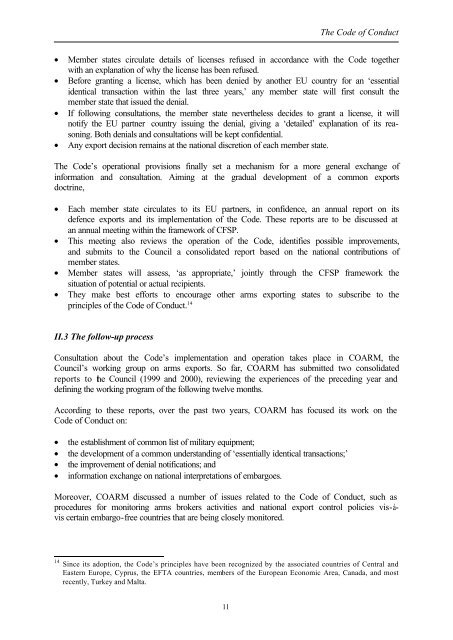A common European export policy for defence and dual-use items?
A common European export policy for defence and dual-use items?
A common European export policy for defence and dual-use items?
Create successful ePaper yourself
Turn your PDF publications into a flip-book with our unique Google optimized e-Paper software.
The Code of Conduct<br />
• Member states circulate details of licenses ref<strong>use</strong>d in accordance with the Code together<br />
with an explanation of why the license has been ref<strong>use</strong>d.<br />
• Be<strong>for</strong>e granting a license, which has been denied by another EU country <strong>for</strong> an ‘essential<br />
identical transaction within the last three years,’ any member state will first consult the<br />
member state that issued the denial.<br />
• If following consultations, the member state nevertheless decides to grant a license, it will<br />
notify the EU partner country issuing the denial, giving a ‘detailed’ explanation of its reasoning.<br />
Both denials <strong>and</strong> consultations will be kept confidential.<br />
• Any <strong>export</strong> decision remains at the national discretion of each member state.<br />
The Code’s operational provisions finally set a mechanism <strong>for</strong> a more general exchange of<br />
in<strong>for</strong>mation <strong>and</strong> consultation. Aiming at the gra<strong>dual</strong> development of a <strong>common</strong> <strong>export</strong>s<br />
doctrine,<br />
• Each member state circulates to its EU partners, in confidence, an annual report on its<br />
<strong>defence</strong> <strong>export</strong>s <strong>and</strong> its implementation of the Code. These reports are to be discussed at<br />
an annual meeting within the framework of CFSP.<br />
• This meeting also reviews the operation of the Code, identifies possible improvements,<br />
<strong>and</strong> submits to the Council a consolidated report based on the national contributions of<br />
member states.<br />
• Member states will assess, ‘as appropriate,’ jointly through the CFSP framework the<br />
situation of potential or actual recipients.<br />
• They make best ef<strong>for</strong>ts to encourage other arms <strong>export</strong>ing states to subscribe to the<br />
principles of the Code of Conduct. 14<br />
II.3 The follow-up process<br />
Consultation about the Code’s implementation <strong>and</strong> operation takes place in COARM, the<br />
Council’s working group on arms <strong>export</strong>s. So far, COARM has submitted two consolidated<br />
reports to the Council (1999 <strong>and</strong> 2000), reviewing the experiences of the preceding year <strong>and</strong><br />
defining the working program of the following twelve months.<br />
According to these reports, over the past two years, COARM has foc<strong>use</strong>d its work on the<br />
Code of Conduct on:<br />
• the establishment of <strong>common</strong> list of military equipment;<br />
• the development of a <strong>common</strong> underst<strong>and</strong>ing of ‘essentially identical transactions;’<br />
• the improvement of denial notifications; <strong>and</strong><br />
• in<strong>for</strong>mation exchange on national interpretations of embargoes.<br />
Moreover, COARM discussed a number of issues related to the Code of Conduct, such as<br />
procedures <strong>for</strong> monitoring arms brokers activities <strong>and</strong> national <strong>export</strong> control policies vis-àvis<br />
certain embargo-free countries that are being closely monitored.<br />
14 Since its adoption, the Code’s principles have been recognized by the associated countries of Central <strong>and</strong><br />
Eastern Europe, Cyprus, the EFTA countries, members of the <strong>European</strong> Economic Area, Canada, <strong>and</strong> most<br />
recently, Turkey <strong>and</strong> Malta.<br />
11
















